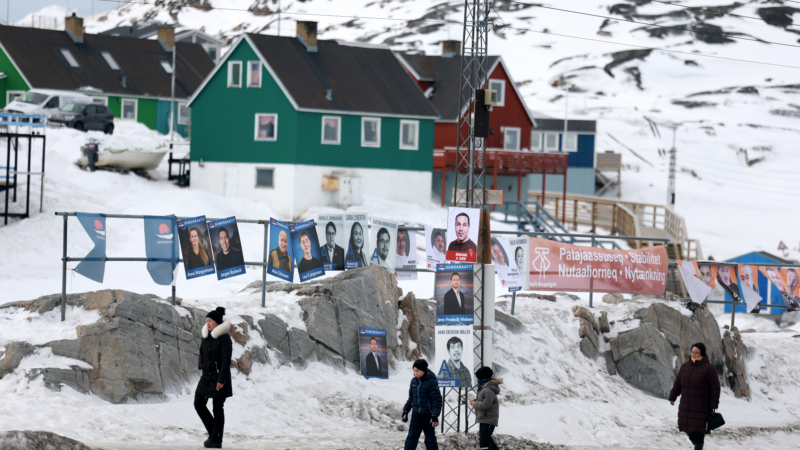Greenland elections are dominated by independence and Trump’s interest in the island
Residents of Greenland are voting Tuesday in what could be the most consequential election in the island’s history, with far-reaching implications for its long-term future. In a population of around 56,000, up to 40,000 eligible voters can participate in this election for the island’s parliament, with decisions that may extend well beyond short-term local concerns.
As the Arctic region becomes increasingly strategic as a battleground for global powers including the U.S., China and Russia, Greenland’s Prime Minister Múte Egede has framed today’s vote as a “fateful choice.” The potential decisions of Greenlanders to eventually seek independence, rebuild ties with Denmark or strengthen the island’s relationship with the United States could have lasting consequences.
The vote has attracted significant global attention in light of the interest shown in the autonomous Arctic territory by President Donald Trump, who sees its strategic location in the mid-Atlantic as vital for a successful U.S. ballistic missile warning system and security in the planet’s rapidly melting northernmost sea channels. Greenland is also rich in untapped mineral resources, including rare earth elements essential for modern technologies.
Six political parties are now vying for control of the 31-seat Greenlandic parliament, known as the Inatsisartut. The possibility of Greenland’s full independence from Denmark, which could dramatically transform its role on the world stage, has became a central focus of the country’s electoral campaigns.
The Inuit Ataqatigiit party of Prime Minister Egede currently holds the most parliamentary seats, as part of a coalition with the legislature’s second-largest party Siumut, and seeks greater autonomy from Denmark.
But the Naleraq opposition party is pushing for more immediate independence from Denmark amid emerging accounts of historic Danish mistreatment of Greenland’s Inuit population. It also favors greater cooperation with the United States. The party has earned increasing levels of support since President Trump’s public calls for a change in Greenland’s constitutional status that have added significant complexity to local politics.
Trump first suggested the U.S. purchase Greenland in 2019, and has repeatedly mentioned the idea since taking office again in January, including an instance in which he said massive U.S. investment would make the island “rich.”
It has been more than 70 years since Greenland became a recognized part of the Kingdom of Denmark, after more than two centuries of sometimes brutal colonialism. The Danish government retains decision-making power for Greenland’s defense and foreign affairs, but since 2009, Greenlanders have held the right to hold an independence referendum — though a referendum is not explicitly on Tuesday’s ballot.
Polls have indicated that a majority of residents support full economic and political independence from the government in Copenhagen, but the speed and timing of such a move is a subject of debate among Greenland’s various political parties.
Denmark currently supports the local economy with more than half a billion dollars each year in direct subsidies. Business leaders in Greenland and Denmark say taking advantage of Greenland’s rich natural resources, including metals and rare earth minerals, to transform the local economy will only be possible with significant overseas investment.
But that does not mean U.S. political influence will be welcome.
“We deserve to be treated with respect, and I don’t think the American president has done that lately,” Prime Minister Egede recently told Danish broadcaster DR.
Egede called Trump’s public remarks about U.S. possession of the island a foreign policy misstep, telling DR the U.S. president’s language had been “disrespectful.”
“Not many Greenlanders wish to become part of the USA and I do think that this will have an influence on the election,” says Hans Jensen, a Danish-born mining executive.
Trump, he says, “is trying to push the Danish government to be much more active in Greenland defense.” He began this effort during his first presidency, at which time the Danish government promised to increase capabilities with new navy vessels and drones. “But nothing has happened yet,” Jensen says.
Many Greenlanders remain wary of U.S. investment in its natural resources in particular — despite the current challenge of otherwise achieving full financial independence from Denmark.
“When [Greenlandic] politicians are elected, they realize that independence is not possible because of the economy,” says Kaare Winther Hansen, a biologist who has worked in Greenland for several years and focuses on preserving the territory’s polar bear populations. “We think we just have to wait the four years with Trump out.”
Deaths reported during widening protests in Iran sparked by ailing economy
The protests began due to economic pressures, with Iran's currency rapidly depreciating. Demonstrators have also chanted against the country's theocracy.
Congress failed to extend Obamacare subsidies. This Democrat says Trump can save them
Sen. Peter Welch, D-Vt., says he thinks the Senate can pass a "retroactive" Affordable Care Act subsidy extension, but "we need President Trump."
Rideshare union rights, social media limits and other state laws taking effect Jan. 1
Every new year, public media reporters across the country bring us some of the new state laws taking effect where they are. Here are six in 2026.
Guides to help you tackle your New Year’s resolutions
From building your strength to tackling credit card debt, NPR's Life Kit has a newsletter journey to help you tackle your New Year's resolution.
Guides to help you tackle your New Year’s resolutions
From building your strength to tackling credit card debt, NPR's Life Kit has a newsletter journey to help you tackle your New Year's resolution.
Dozens presumed dead in fire at Swiss Alps bar during New Year’s celebration
Dozens of people are presumed dead and about 100 injured, most of them seriously, following a fire at a Swiss Alps bar during a New Year's celebration, police said Thursday.






